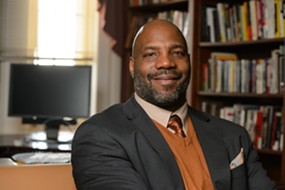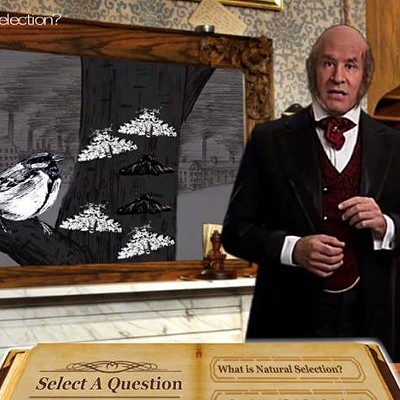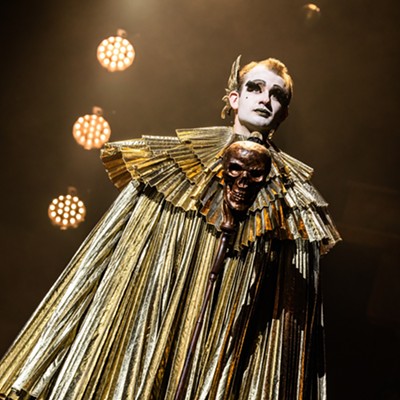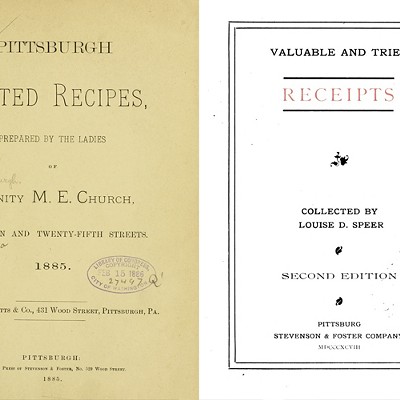Friday, February 12, 2016
Review: Jelani Cobb at Carnegie Mellon University
Black history, we’re often reminded during Black History Month, is simply American history. But as Cobb noted in his great talk yesterday, the reverse is also true: You can’t grasp American history without understanding the role of race.
That role goes beyond the well-documented fact that the nation’s fundamental wealth was extracted from exploited black bodies — starting with chattel slavery, which, as every schoolkid should know, was written into the Constitution. (And, as Cobb reminded us, a Jeffersonian condemnation of which was written out of the Declaration of Independence.)
Race is also at the heart of so seemingly simple a matter of how many states we have, and where. Cobb cited the long-running 19th-century practice of admitting new free and slave states in “pairs”: Maine was created only so that Missouri could be a state, for instance. And he said Gen. Andrew Jackson (not yet president) seized the Spanish territory of Florida for the U.S. largely at the behest of Georgia slaveholders, who were losing runaways to the nonslaveholding land to the south.
History remains alive. When Cobb, a history professor at the University of Connecticut, visited Ferguson, Mo., for The New Yorker, he said, he got “the overwhelming sense that my syllabus had jumped off the page.” From Ferguson to Charleston, S.C., Cobb found the history of race in America embedded down to the very street names: Emanuel African Methodist Episcopal Church, the Charleston church where a horrific shooting took place last year, is on a street named for pro-slavery politician John Calhoun.
Cobb also recalled how, for decades, federal policy to facilitate the mortgages that helped build middle-class America effectively excluded black Americans. And even many apparent advances in race relations are heavily qualified: How could Barack Obama’s election in 2008 herald a “post-racial” era when only 39 percent of white voters chose him? (And why, for that matter, Cobb asked, did no one laud black voters as post-racial during the decades they spent voting for white candidates?)
Still, Cobb said he counts himself as an optimist, though his optimism is tempered by a historian’s long view. Take Obama’s election. While an African-American chief executive had been unthinkable as recently as, oh, 2007, Cobb said, “Until we had a black presidency, we did not properly conceive of the limitations of one.” Likewise, just as Obama himself is a community activist who decided he could achieve more through electoral politics, his struggles in office have convinced a whole new generation of activists, like the folks in Black Lives Matter, that real change comes from the streets.
Finally, some interesting words on racialized monuments. Though Cobb cheered the removal of the Confederate flag from South Carolina’s statehouse, he pointed out that other, less obvious plaques and statues honoring Confederates and even lynchers remain abundant there and elsewhere. Yet “I do not think we should take any of those monuments down,” he said. For one thing, simply eliminating the monuments allows whites to grant themselves too easy an absolution for the wrongs of the past. Two, “like removing fingerprints from the scene of a crime,” mere removal effaces a history we need to remember. It would be more useful, Cobb said, to amend the monuments with signage identifying them as “monuments to our own inhumanity.”
Cobb was CMU’s featured Martin Luther King, Jr., speaker. (Here's the rest of the school's month-long roster of MLK programming.) The free on-campus event was attended by about 200 folks, most of whom seemed to be students and faculty. But the talk, which began at 4:30 p.m., was so good I wish more Pittsburghers could have seen it. Is it too much to ask of CMU (and other universities, for that matter) to hold more of these events after 6 p.m., say, when more working folks could attend? Just a thought.
That role goes beyond the well-documented fact that the nation’s fundamental wealth was extracted from exploited black bodies — starting with chattel slavery, which, as every schoolkid should know, was written into the Constitution. (And, as Cobb reminded us, a Jeffersonian condemnation of which was written out of the Declaration of Independence.)
Race is also at the heart of so seemingly simple a matter of how many states we have, and where. Cobb cited the long-running 19th-century practice of admitting new free and slave states in “pairs”: Maine was created only so that Missouri could be a state, for instance. And he said Gen. Andrew Jackson (not yet president) seized the Spanish territory of Florida for the U.S. largely at the behest of Georgia slaveholders, who were losing runaways to the nonslaveholding land to the south.
History remains alive. When Cobb, a history professor at the University of Connecticut, visited Ferguson, Mo., for The New Yorker, he said, he got “the overwhelming sense that my syllabus had jumped off the page.” From Ferguson to Charleston, S.C., Cobb found the history of race in America embedded down to the very street names: Emanuel African Methodist Episcopal Church, the Charleston church where a horrific shooting took place last year, is on a street named for pro-slavery politician John Calhoun.
Cobb also recalled how, for decades, federal policy to facilitate the mortgages that helped build middle-class America effectively excluded black Americans. And even many apparent advances in race relations are heavily qualified: How could Barack Obama’s election in 2008 herald a “post-racial” era when only 39 percent of white voters chose him? (And why, for that matter, Cobb asked, did no one laud black voters as post-racial during the decades they spent voting for white candidates?)
Still, Cobb said he counts himself as an optimist, though his optimism is tempered by a historian’s long view. Take Obama’s election. While an African-American chief executive had been unthinkable as recently as, oh, 2007, Cobb said, “Until we had a black presidency, we did not properly conceive of the limitations of one.” Likewise, just as Obama himself is a community activist who decided he could achieve more through electoral politics, his struggles in office have convinced a whole new generation of activists, like the folks in Black Lives Matter, that real change comes from the streets.
Finally, some interesting words on racialized monuments. Though Cobb cheered the removal of the Confederate flag from South Carolina’s statehouse, he pointed out that other, less obvious plaques and statues honoring Confederates and even lynchers remain abundant there and elsewhere. Yet “I do not think we should take any of those monuments down,” he said. For one thing, simply eliminating the monuments allows whites to grant themselves too easy an absolution for the wrongs of the past. Two, “like removing fingerprints from the scene of a crime,” mere removal effaces a history we need to remember. It would be more useful, Cobb said, to amend the monuments with signage identifying them as “monuments to our own inhumanity.”
Cobb was CMU’s featured Martin Luther King, Jr., speaker. (Here's the rest of the school's month-long roster of MLK programming.) The free on-campus event was attended by about 200 folks, most of whom seemed to be students and faculty. But the talk, which began at 4:30 p.m., was so good I wish more Pittsburghers could have seen it. Is it too much to ask of CMU (and other universities, for that matter) to hold more of these events after 6 p.m., say, when more working folks could attend? Just a thought.
Tags: Jelani Cobb , Carnegie Mellon University , race , race in America , Image
















